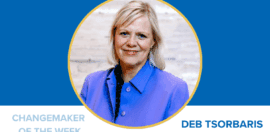Empowering young people to get through tough times

29 March 2024 at 9:00 am
This weeks Pro Bono Australia change maker is Katie Acheson – a former Chair of the Australian Youth Affairs Coalition, co-founder of Numbers and People Synergy and was also previously the CEO of Youth Action – a peak body representing young people and the services that support them in NSW.
Katie Acheson is regularly called on in the public sphere for her expertise in the youth space: Acheson was the lead youth consultant for United Nations World Youth Report 2022, the UN’s flagship youth publication, released every two years to spotlight essential aspects of youth development, and was an Australian Youth Expert for the Commonwealth Youth Development Index 2016 and 2020.
In 2023, Acheson received a Churchill Fellowship to further her research into how involving young people in decision-making can help address rising mental ill-health amongst youth. Katie regularly comments in the public space on a diverse range of issues, including; youth mental health and wellbeing, education, homelessness, domestic and family violence, youth justice, youth employment, drugs and alcohol, health, and welfare. Read on for our interview with Katie!
Describe your career trajectory and how you got to your current position.
My career has been a journey of supporting young people, to action and advocacy in youth mental health. It began with grassroots initiatives and evolved through roles where strategic leadership was key to driving change. Each step—from managing youth programs at Anglicare to chairing the Australian Youth Affairs Coalition — taught me the power of collective effort and the importance of respecting young people’s expertise when they are often locked out of decision making rooms. Now, as a leader in a non-profit, I harness all those lessons to champion mental health reform and youth inclusion in decision making.
What does this role mean to you?
This role is more than a job; it’s a passion. It’s about being at the frontline, leading the charge with young people against mental health stigma, and being part of a larger conversation that shapes policies and transforms lives. It means I can contribute to a future where young people’s mental health is not just a dream but a reality we’re actively building every day.
Take us through a typical day of work for you.
My day often starts with a team chat, aligning our efforts with opportunities that have come up. We will navigate through strategic planning, collaborate with stakeholders, or support stigma-reduction campaigns. No two days are the same, but they all thread back to one goal: empowering young people to get the support they need and navigate through tough times. There are a lot of meetings and emails, lots and lots of emails.
What is the biggest challenge you’ve encountered in your career, and how did you overcome it?
Navigating the ever-shifting power dynamics in the sector has been my greatest challenge—be it changes in government, shifts in community focus, media narratives, or internal organisational politics. These fluctuations can significantly impact our strategies and resources. My role is often to guide the organisation through these tides while maintaining our focus on the needs of young people. This has involved leading my team with resilience, especially through tough losses, and helping us collectively find learnings in every setback. We’ve adapted our approaches, ensuring that we’re not just reactive, but also proactive in anticipating changes. This dynamic way of operating has strengthened our capacity to serve young people effectively, regardless of the external environment.
If you could go back in time, what piece of advice would you give yourself as you first embarked on your career?
I would shake myself and say – you will never be perfect. The real goal is progress, continually just moving forward. Embrace every experience, especially the failures— I promise they often turn out to be unexpected gifts, sometimes even paving the way for future successes. Celebrate the experience of doing this work, be kind to yourself, and surround yourself with passionate individuals who share your values. They will make work fun and will become mentors for your life.
How do you stay motivated to work in this field?
My motivation is fueled by the stories of young people and the incredible changes they create. The power of storytelling, a lesson we learn from our First Nations people, has the potential to transform our country for the better. It reminds me daily of the importance of making room for and valuing the expertise and experiences from the Australian people themselves. Hearing these stories, witnessing their impact, and seeing the tangible results of our efforts keeps me driven and committed to this work.
How do you unwind after work?
I embrace my alter ego as a roller derby wannabe — it’s all about the adrenaline and the inclusive vibes of the derby community. Then there’s the “forced” nature therapy, where my partner drags me out for walks, a necessary evil for a mind that rarely hits pause. For a dose of mindless fun, bad reality TV is my go-to; it’s like a brain vacation. And, of course, my friends are the ultimate stress-busters with their uncanny ability to remind me what life is really about – connection.
What was the last thing you: Watched, Read, & Listened to?
Watched: Survivor Australia
Read: I read for work so normally it would be the latest youth development research.
Listened to: Armchair expert – a great podcast with leading experts sharing ideas in a really palatable way. Also love Armchair Anonymous – where people share stories about random topics that are always harrowing, hilarious or bizarre.







